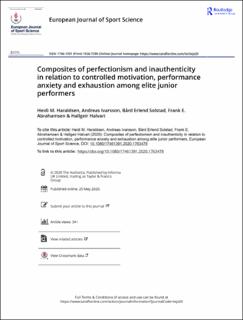| dc.contributor.author | Haraldsen, Heidi M. | |
| dc.contributor.author | Ivarsson, Andreas | |
| dc.contributor.author | Solstad, Bård Erlend | |
| dc.contributor.author | Abrahamsen, Frank Eirik | |
| dc.contributor.author | Halvari, Hallgeir | |
| dc.date.accessioned | 2020-10-16T07:43:02Z | |
| dc.date.available | 2020-10-16T07:43:02Z | |
| dc.date.created | 2020-04-30T11:22:02Z | |
| dc.date.issued | 2020 | |
| dc.identifier.citation | Haraldsen, H. M., Ivarsson, A., Solstad, B. E. & Abrahamsen, F. E. & Halvari, H. (2020). Composites of perfectionism and inauthenticity in relation to controlled motivation, performance anxiety and exhaustion among elite junior performers. European Journal of Sport Science. doi: | en_US |
| dc.identifier.issn | 1536-7290 | |
| dc.identifier.uri | https://hdl.handle.net/11250/2683204 | |
| dc.description.abstract | The present study identified profiles of perfectionism and inauthenticity at baseline and tested whether they differed in the maladaptive outcomes of controlled motivation, performance anxiety, and exhaustion after a nine-month period. We purposefully selected elite junior performers (NT1 = 219; NT2 = 156), 16–19 years of age, from Norwegian talent development schools in sports and performing arts. The participants completed questionnaires to report their perceptions of the study variables. The results of the latent profile analysis indicated a multidimensionality of perfectionism, thereby identifying four profiles. Although our identified profiles are in line with the 2×2 model of perfectionism; however, the results of the mean differences between the identified profiles did not align with the 2×2 model’s hypotheses. The elite junior performers who displayed non-perfectionism demonstrated to be the most adaptive profile. They reported the lowest level of inauthenticity and the maladaptive outcomes of controlled motivation, performance anxiety, and exhaustion. The mixed perfectionism profile, displaying high levels of perfectionistic concerns (PC) and perfectionistic strivings (PS), demonstrated to be the least adaptive profile. This profile reported higher levels of inauthenticity and was even more maladaptive than the PC dominated profile contrary to the proposed hypotheses. Findings showed that a heightened vulnerability of perfectionism seems evident in PC, independent of the reported PS levels. Because only one out of five elite junior performers were distributed in the non-perfectionism profile, the vulnerability of perfectionism might be an important risk factor to note in talent development settings. | en_US |
| dc.language.iso | eng | en_US |
| dc.publisher | Taylor & Francis | en_US |
| dc.rights | Attribution-NonCommercial-NoDerivatives 4.0 Internasjonal | * |
| dc.rights.uri | http://creativecommons.org/licenses/by-nc-nd/4.0/deed.no | * |
| dc.title | Composites of perfectionism and inauthenticity in relation to controlled motivation, performance anxiety and exhaustion among elite junior performers | en_US |
| dc.type | Journal article | en_US |
| dc.type | Peer reviewed | en_US |
| dc.description.version | publishedVersion | en_US |
| dc.rights.holder | © 2020 The Author(s). | en_US |
| dc.subject.nsi | VDP::Medisinske Fag: 700::Idrettsmedisinske fag: 850 | en_US |
| dc.source.journal | European Journal of Sport Science | en_US |
| dc.identifier.doi | 10.1080/17461391.2020.1763478 | |
| dc.identifier.cristin | 1808805 | |
| dc.description.localcode | Paid Open Access | |
| dc.description.localcode | UNIT agreement | |
| cristin.qualitycode | 1 | |

